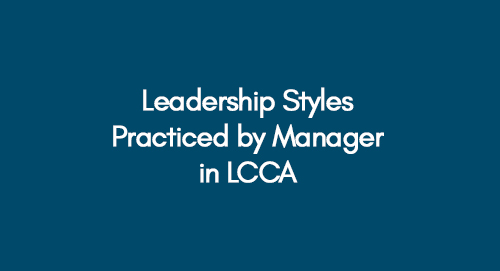
Critical Evaluation of Management Accounting and Budgetary Control- A Case Study of the Ice Department
June 2, 2022
Data Analysis Using SPSS
June 2, 2022Introduction
The following report critically highlights leadership styles practised by managers in LCCA (London School of Contemporary Arts) and how it impacts the overall progress of the organization. The process of setting and achieving goals is known as management. In contrast, leadership is known as the ability to make other people follow you and influence or guide others (Popovici, 2012). Moreover, leadership and management are viewed differently by different people. Some consider these two synonymous terms, whereas some identify them as two distinct functions (Algahtani, 2014).
London School of Contemporary Arts (LCCA) is a multi-arts management studies college and is part of the LSBF (London School of Business and Finance) Group. LCCA was founded by Aaron Etingen and Sagi Hartov and is located in Holborn, London (BAC, 2019). LCCA provides professional development and vocational training in several art-related areas, offers work placement options, and one-to-one sessions with people working in the fashion industry. This organization also validates post-graduate and undergraduate degrees from European and UK institutions. It offers courses in Design and Fashion, Graphics and Multimedia, Photography and Moving Image, and Creative Arts Management (BAC, 2019).
Role of a Manager
The enhancement of strategy to achieve coordination that yields to be effective for any firm is management (Fernie and Sparks, 2014). The managers must achieve short-term goals without risks to improve the firm's efficiency by establishing standardisation. Effective managers are required to have three foremost skills that are human, technical and conceptual (Algahtani, 2014). For example, in LCCA, the manager is responsible for maintaining the day-to-day tasks within their deadlines, managing the budgets, classes and timetables, and directing teachers efficiently to obtain certain objectives for the successful results of the students of the college. Moreover, the role of managers in LCCA includes working with staff to promote target delivery in terms of teaching observations and developing quality learning and teaching. They are also responsible for participating and coordinating, reviewing records, ensuring improvement plans are developed, maintaining consistency to ensure high-quality assessment strategies, assisting in the preparation of documentation, ensuring action plans are being established, working with external partners for the development of new curriculum and promoting employability for graduates (BAC, 2019).
Role of a Leader
Leadership is a practical approach that encompasses the organisation’s ability by providing leading criteria by guiding and motivating employees to achieve goals set for the firm to attain smooth success for any business. The leader provides direction to the followers to have some critical qualities, including vision, toughness, integrity, trust, commitment, decisiveness, selflessness, risk-taking and creativity (Popovici, 2012). In LCCA, a leader is transformational and aims to reach long-term goals by creating passion among employees to follow the college's vision, take risks to achieve the most certain goals and challenge the current status of the college by accomplishing new goals and ideas (Nwagbara, 2010). Moreover, the role of leadership styles practised by managers in LCCA includes offering academic leadership, giving inspiration to learners and faculty members, including promoting learning, teaching and meeting the needs of learners, converting the strategies into operational objectives and plans, and motivating the faculty members to deliver the operational plan and accomplish the targets set (BAC, 2019).
Comparison between a Leader and a Manager
Managers and leaders are two different authoritative heads in any organisation, and the most significant difference is how they follow to inspire their teammates. It can be stated that managers direct their subordinates, whereas leaders direct their followers (Prudzienica and Mlodzinska-Granek, 2014). Managers have a team, and their task is to make their team fulfil their assigned tasks. Alternatively, a leader is followed by the entire firm, deemed a voluntary activity. Leaders are needed to grasp the knowledge regarding essential facts and forces to determine or follow the past and present trends of the business. Based on these trends, they evaluate the future movement by generating a strategy and vision (Algahtani, 2014).
Role of a Leader and manager in Different Situational Contexts
In LCCA, the functions of a manager are related to leading quality, standards improvement and monitoring quality compliance, and recognising curriculum establishment prospects to increase the efficiency of LCCA. The functions of managers also include implementing improvement strategies based on external feedback for each programme and overviewing that internal reviews are effective and being carried out. Moreover, overviewing the quality management of provision and establishing a quality enhancement, they tend to construct improvement plans based on data received from subject specialities, external verifiers, internal student satisfaction surveys and awarding bodies (BAC, 2019).
The role of a leader in LCCA includes indulging in development, research and scholarly activities, and participating in collaborative and institutional research or/and engaging with external commercial organisations and institutions. With the leadership styles practised by managers in LCCA, they tend to develop new programmes, collaborate with business community members to enhance programmes and offer students access to internships and guest lectures. (BAC, 2019). There can be varied situations in which an organisation’s effectiveness can be identified, such as a stable situation in which the organisation is not prone to any further changes. For this purpose, they must maintain the firm’s stability (Samantara and Sharma, 2015).
For example, LCCA can maintain stability if the financial condition of the college is sustained, and revenue can be enhanced by increasing enrolment, changes in programme offerings, improving recruitment, increasing grants, scholarships and gift money to reduce reliance on fees (Chopp, Frost and Weiss, 2016). Furthermore, the situation can be slow to moderate. This can be a changing scenario for LCCA and can affect the factors that moderated the college’s success, such as a decline in birth rate, financial conditions, paid debt, number of students, fundraising and the budget is not controlled. All these changing situations can affect the college’s effectiveness and success results. At last, when the situation is at a fast pace, these conditions can drive fluctuations for LCCA (Fernie and Sparks, 2014).
Situational Leadership Styles
Leadership by Coaching
Although studies show several leadership styles practised by managers in LCCA, few are significantly noticeable and beneficial The type of situational leadership, which includes ‘hands-on’ involvement in an employee’s work performance, is known as leadership by coaching. As LCCA focuses on its student’s achievements, this leadership style can be adopted by managers to cultivate students for the future (Beaver, 2011). A coaching manager can connect with students to assist them in learning personal ambitions and offer them feedback regularly while working with the students in activities toward those ambitions. This leadership style can be effective for LCCA when its students are motivated, and the primary aim is to enhance students' performance by increasing their capabilities (Beaver, 2011).
Leadership by Direction
The directing leadership style is associated with challenging situations requiring scientific knowledge and experience (McCleskey, 2014). For example, in LCCA, when recruits are included in the organization management or faculty, this style is adopted in directing employee’s activities to obtain the college’s goal and vision that motivates, influences, and inspires them. This leadership style can assist LCCA in maintaining compliance. This leadership style often uses force, power, or persuasion to lead others. The managers at LCCA can reduce students' fear by providing them with clear directions in urgent situations and directly influencing their students’ achievements and community involvement, as this leadership style is a top-down approach to management (Beaver, 2011).
Leadership by Delegation
This leadership style involves the worker's responsibility more than the manager's; in delegating leadership, the workers are only provided with the direction or guidance required by the managers. LCCA’s managers can follow a delegation leadership style for their students' professional development and their faculty's job performance (Asgari, 2014). This can encourage the faculty of LCCA to give feedback and psychologically empower them by identifying suitable assignments, keeping in mind the organizational expectations, recruiting the right individuals, providing the right direction to the faculty members, and supporting their performance through supervision problem-solving (Asgari, 2014). It can assist LCCA in highlighting the expertise of its faculty members and promoting workplace satisfaction.
Supportive Leadership Style
This is a type of leadership in which the leaders allow the employee to be more participative in the decision-making process for any business strategy. This brings motivation employees, and they feel supported and ultimately work better for the organization (Ibrahim, Alkhawlani and Al-shaghdari, 2017). Among the leadership styles practised by managers in LCCA, this one increases productivity and maximize the successful results of the college students by being supportive of the teachers and the students. (Antonakis and Robert, 2013).
Managers of LCCA can practise this leadership style to encourage their faculty member’s teamwork, showing commitment to them by providing training and exchanging dialogues with them, expressing concern, respect, and trust by being understanding, considerate, informative, and sympathetic. Moreover, by adopting this leadership style, managers can support their faculty members until the completion of the task and until they are skilled enough to handle assignments with minimal supervision and can assist them in their development (Khalid et al., 2012).
Different Approaches to Leadership in LCCA
According to Peck and Dickinson (2008), an organization’s leadership and management are effective when leaders are transformational while managers are transactional. LCCA follows leadership and management skills to progress further, which is why the college always tries to bring change in their educational curricula by promoting new talents, polishing their skills and making them able to get good jobs in the market (Popovici, 2012). As far as LCCA is concerned, its leaders and managers have applied the principle of transformational leadership as the college has sustained its vision, considered a logical simulation of its members, and considered its members individually (Muthiani, 2019; Rautiola, 2009).
This leadership style has increased the value of the college and its members and has motivated them to go above self-interest (Muthiani, 2019; Rautiola, 2009) to embrace the college’s goals. Among the leadership styles practised by managers in LCCA, the success of LCCA is due to its transformational leadership style. Moreover, a creative leadership style is a transformational process in which people use their potential and creativity to realize the firm's goals (Sohmen, 2015). This leadership style has assisted in identifying three attributes for the college that are: creativity, clarity, and empathy, which are broadly recognized as leadership values and play a key role in development, availing world-class expertise and increasing connections, networking, and interaction among members belonging from different backgrounds (Sohmen, 2015).
Situational Leadership in LCCA
The focus on the best action depending upon the specific situational variables is known as situational leadership theory. For example, in LCCA, when there is any inevitable conflict in roles, team, and responsibilities of the team members, applying situational theory effectively solves the conflict as these leadership styles deal with challenges that arise within a firm. Influential situational leaders in LCCA scan the situation and, with the proper knowledge, respond to the situation in the most effective way (McCleskey, 2014).
Situational leadership can enhance collaboration among faculty members based on the relationship between leaders and followers. These leaders also tend to demonstrate adaptability to fit situations and improve work productivity, faculty motivation, and development. On the other hand, they also assist in assessing the maturity levels of individuals, encourage support, provision of guidance and direction, assist in countering uncertainty, volatility, complexity, and ambiguity, effectively respond to situations and control possible outcomes in LCCA (Thompson and Glasø, 2015).
Contingency Leadership in LCCA
This theory is closely linked with situational theory and depends upon environmental variables (Bhuyan, 2019). It determines the way any situation should be led. However, there is a strong correlation between situational and contingency theory and is one difference. Therefore, the class of behavioural theory is called contingency theory, which depends upon a firm's internal and external factors (Nwagbara, 2010; Ivanov et al., 2017). In LCCA, the leader guides his subordinates on how to act in a particular situation when there is a need to make a shared decision (McCleskey, 2014). The contingency theory of leadership can display if a leader’s leadership style matches the situations (Fiedler, 2015) in LCCA, as the work environment, faculty members and the culture in LCCA can impact a leader’s or manager’s success in the process of leadership (Fiedler, 2015).
System Leadership in LCCA
System leadership theory focuses on results and does not rely upon the steps taken to attain achievement in certain activities, i.e. effects are monitored earlier and later compared with the actual outcomes. Among several leadership styles practised by managers in LCCA, the system leadership style of leaders and managers can facilitate the situations in which its members can advance towards social change (Senge, Hamilton, and Kania, 2015). This leadership style can introduce the ability to see a larger system and generative conversations, foster reflection, and shift the overall focus from problem-solving to co-creating a future by engaging, energizing, committing, acting with accountability, reviewing, revising, and learning (Senge, Hamilton, and Kania, 2015) in LCCA. In addition, the gaps in system theory are fulfilled by contingency theory. However, the main difference is that system theory considers internal factors as an essential characteristic of the firm. In contrast, contingency theory deals with external determinants; it works to remedy any crucial situations (Nwagbara, 2010).
Strengths and Weaknesses of Different Approaches to Situations within the Work Environment

Critical Analysis of Leadership Theories
The prominent leadership theories are situational, behavioural, and trait (Nawaz and Khan, 2016). Trait theory examines what makes a leader successful depending upon innate and acquirable qualities. The trait theory is simple but criticized for providing no precise results (Sethuraman and Suresh, 2014). In comparison to trait theory, behavioural theory is emphasized as a practical theory to explain the role of the behaviour of strong leadership (Nawaz and Khan, 2016). The behaviour is affected by goals, leaders, followers, and the environment.
Therefore, the difference between these two theories is that behavioural theory examines the particular trait of the leader. This is more effective than trait theory but suffers from a drawback, the time factor, and it does not result positively in every situation (Nawaz and Khan, 2016). Situational leadership is surrounded by these essential factors and is better than behavioural theory. It is the most essential leadership theory as it determines how leadership behaviours should vary with multiple situational variables (Thompson and Glasø, 2015).
Conclusion
The report analyses the role of managers and leaders and how these roles differ in an organizational context. Leaders in LCCA follow the transformational leadership style by adopting appropriate strategies to enhance management practice by achieving targets and gaining competitive advantages compared to other colleges. Moreover, managers have subordinates who direct their actions to make effective decisions.
Review the following:
References
Algahtani, A., 2014. Are leadership and management different? A review. Journal of Management Policies and Practices, 2(3), pp.71-82.
Antonakis, J. and Robert, J., 2013. House (2013).'The Full-Range Leadership Theory: The Way Forward', Transformational and Charismatic Leadership: The Road Ahead 10th Anniversary Edition (Monographs in Leadership and Management, Volume 5) (pp. 3-33). Emerald Group Publishing Limited
Asgari, M.R., 2014. The effect of leadership styles on employees' commitment to service quality in bank Melli branches of Isfahan. Kuwait chapter of the Arabian journal of business and management review, 3(12), p.113.
BAC., 2019. BRITISH ACCREDITATION COUNCIL INSPECTION REPORT. [online] Available at: <http://www.the-bac.org/wp-content/uploads/2019/05/LCCA-End-of-Probation-Supplementary-Management-Report-March-2019-FINAL.pdf> [Accessed 25 March 2020].
Beaver, H.O., 2011. The relationship between situational leadership and student achievement.
Bhuyan, A.H.M.M.I., 2019. Organizational Performance Management and Leadership Development: Theories, Styles, Ethical, and Legal Issues. In MESSAGE FROM THE CONFERENCE CHAIRS (p. 356).
Fernie, J. and Sparks, L. eds., 2018. Logistics and retail management: emerging issues and new challenges in the retail supply chain. Kogan page publishers.
Fiedler, F.R.E.D., 2015. Contingency theory of leadership. Organizational Behavior 1: Essential Theories of Motivation and Leadership, 232, pp.01-2015.
Ibrahim, A.A., Alkhawlani, M.A.A. and Al-shaghdari, F.M., 2017. Customers' Desires on Marketing Mix and Its Impacts on Tesco (Malaysia). International Sciences of Management Journal, 1(1).
Ivanov, D., Tsipoulanidis, A. and Schönberger, J., 2017. Global supply chain and operations management. A Decision-Oriented Introduction to the Creation of Value.
Khalid, A., Zafar, A., Zafar, M.A., Saqib, L. and Mushtaq, R., 2012. Role of supportive leadership as a moderator between job stress and job performance. Information Management and Business Review, 4(9), pp.487-495.
McCleskey, J.A., 2014. Situational, transformational, and transactional leadership and leadership development. Journal of Business Studies Quarterly, 5(4), p.117.
Muthiani, M.J., 2019. The Impact of Leadership on Learning Outcomes: A Study on Effective Leadership Style for Principals in Vocational Colleges. In Predictive Models for School Leadership and Practices (pp. 308-327). IGI Global.
Nawaz, Z.A.K.D.A. and Khan, I., 2016. Leadership theories and styles: A literature review. Leadership, 16(1), pp.1-7.
Nwagbara, U., 2010. Managing Organizational Change: Leadership, Tesco, and Leahy's Resignation. E-Journal of Organizational Learning and Leadership, 9(1), pp.56-79.
Popovici, V., 2012. Similarities and differences between management and leadership. Annals Economy Series, 2, pp.126-135.
Prudzienica, M. and Mlodzinska-Granek, A., 2014. The role of manager or leader in a non-profit organization. Актуальні проблеми економіки, (10), pp.321-328.
Rautiola, J.D., 2009. Effects of leadership styles and student academic achievement. Unpublished master thesis), MI, USA: Northern Michigan University.
Samantara, R. and Sharma, N., 2015. Talent Management at Tesco: A Case Study. Parikalpana: KIIT Journal of Management, 11(2)
Senge, P., Hamilton, H. and Kania, J., 2015. The dawn of system leadership. Stanford Social Innovation Review, 13(1), pp.27-33.
Sethuraman, K. and Suresh, J., 2014. Effective leadership styles. International Business Research, 7(9), p.165.
Sohmen, V.S., 2015. Reflections on creative leadership. International Journal of Global Business, 8(1).
Thompson, G., and Glasø, L., 2015. Situational leadership theory: a test from three perspectives. Leadership & Organization Development Journal.
Get 3+ Free Dissertation Topics within 24 hours?
Free Dissertation Topic


















 Download PDF File
Download PDF File







